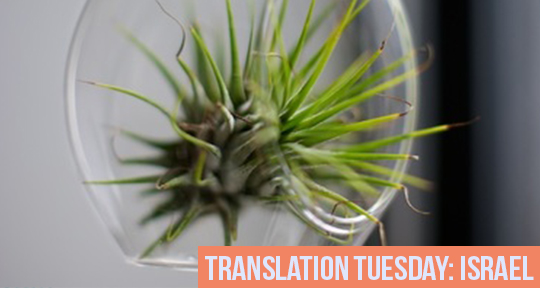For this week’s Translation Tuesday, a lonely pensioner opines about life and horticulture in this moving slice-of-life narrative by Inbar Livnat. To carry our narrator’s nuanced voice into English, translator Shoshana Akabas adroitly deploys several techniques to capture the source language’s uniqueness. Writes Akabas: “Livnat’s writing is very cerebral and contains long sentences, which are much easier to understand in the original Hebrew; articles, prepositions, conjunctions, and pronouns are often attached to other words in Hebrew, which allows for concision that is not possible in English. I often had to split sentences or drastically alter punctuation to attempt to give an English reader the same experience or level of comprehension that a Hebrew reader might enjoy. […] On a more macro level, Livnat’s clipped, digressive prose is very characteristic of the modern Israeli style (be it literature, film, or visual art). In the United States, however, that disjointedness is considered much more experimental.”
The old woman in the greenhouse is me. I’m the one planting the Zamioculcas in the yard, growing air plants. I know that time passes, and time is what gives life to my epiphytes. I’m talking about plants that grow only in air that is steeped in humidity. I’m that way too: I grow old in humid air. I don’t feel it moment to moment, but if you put a camera there and photograph me every week, you’d see a difference, just like with the air plants. Like me, they scare some people, all bent, looking a bit like thorns. To me, they resemble fungus, something that isn’t supposed to grow, something that, if no one mentioned it, you’d just forget in some corner. My yard is full of air plants. There are already nurseries contacting me, asking if they can please buy some of the rare ones. Of course I could water and spray them, and, generally, dedication is a vehicle for good, but on principle, I do not nurture them. Just watch them. Just watch them survive. And they do survive. I’m by myself most hours of the day, anyway—I don’t need pity from anyone, thank you very much, that’s what I do best. I’m a retired archeologist and my pension is horrible, so my kids help a little. The state definitely doesn’t. The state’s not good for much, so perhaps I made a mistake giving it all my best years, if that’s what they were. Since Chaim’s gone, I’m alone every day. Oh, I already said that? Alright, so maybe it wasn’t such a good idea to come interview me. Can’t you send the photographer out for a walk now, and you and I can drink some tea in peace and quiet? All this fuss, and for what? I’ll make some tea for us and you can tell me a little about your studies and what a journalist does these days. I hope I’m not talking too much. Ah, no? Good. Well, if the photographer won’t go for a walk, tell him to take pictures of my plants. There are plenty of them. Me? Why on earth would you want to photograph an old lady like me? What do you mean, I’m just being modest? I think you’d be good to sit here on the sofa. It’s not that bad, right? It’s not that bad. READ MORE…

